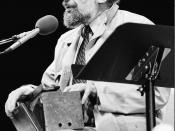The 1950s in the United States marked the beginning of the civil rights movement, the Cold War between the US and the Soviet Union, and the emergence of Rock 'n Roll with Elvis. These events impacted American culture and society and gave way to new ideas and innovations by the baby boomers. Written in this decade, more specifically in 1956, "America" by Allen Ginsberg reflects Ginsberg's personal views on the happenings of this era. Through the poem's general tone and theme, where he references many people and places of the time, and the extensive use of anaphora, Ginsberg is able to convey the notion of being an American in the fifties dealing with the political and social stresses of the time.
Throughout the poem, there exist two dominant, but conflicting themes. The first main theme is that of Ginsberg's disillusionment with American culture and his own life, which conflicts with the poem's other theme of love for America and its culture.
The first line of the poem demonstrates this confusion, "America I've given you all and now I'm nothing" (1). All the good that he was born with has now diminished, sucked away by the evils in America, leaving Ginsberg empty. But Ginsberg connects himself to America, as one, saying, "America when will we end this human war?" (4). The "we" in this line clearly emphasizes Ginsberg's connection and dedication to America, even though he is disappointed with the country's actions and is angry that America took from him all that was good. Conversely, he writes, "America when will you be angelic?" (8). Again, the confusion between themes becomes apparent. Here, Ginsberg removes himself as an American, and uses the word "you" instead of the "we" he had used prior. He continues with "you" for the next six lines, asking...


